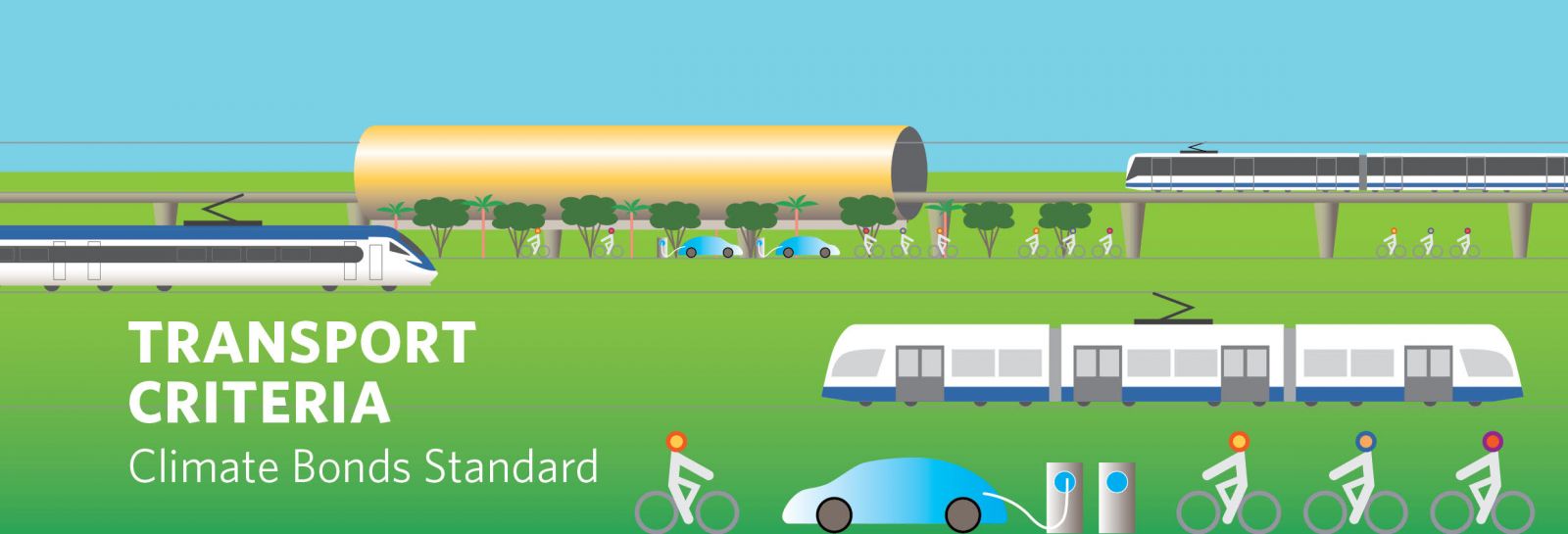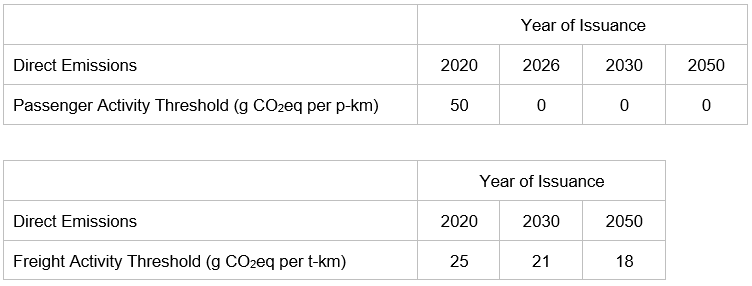
Note (9 June 2022): Airports and their role in a low-carbon economy are under review; currently airport assets/uses of proceeds are ineligible for certification.
Note (3 November 2020): Version 2 of the Low Carbon Transport Criteria is available for use in certifications. Version 1 of the Criteria may be found here and has been replaced by Version 2.
Get in contact with certification@climatebonds.net to begin the process of certifying your low carbon transport green bond.
-
Most fully electric, hydrogen, or other zero-direct emissions transport - including private vehicles, passenger trains, urban subway/metro, trams, and their directly supporting infrastructure
-
Electric charging and hydrogen fuelling infrastructure
-
Public walking and bicycle infrastructure
-
Some types of manufacturing facilities for components of the above
-
Zero direct-emissions (such as electric or hydrogen) freight rail, for which <25% of its freight is fossil fuels
-
Hybrid private vehicles (not including lorries or trucks)
-
Fossil fuelled public transport - buses, trains
-
Technology and infrastructure that allows for car sharing schemes, road charging systems, better utilisation of public transport, and other such systems

CO2 emissions thresholds
1. Land Transport Criteria Brochure
2. Land Transport Criteria Document
3. Land Transport Background Paper
4. Bus Rapid Transit Eligibility criteria
5. Frequently Asked Questions (FAQs)
6. Summary of key differences from Version 1
Certifications
To see the whole list of Low Carbon Transport Climate Bonds, visit our Database of Certified Bonds
Timeline of development:
Oct 2020: Criteria Version 2 available for certification
Feb 2016: Criteria available for certification
Oct 2015: Criteria out for public consultation
Dec 2014: Bus Rapid Transit eligibility criteria approved
Jan 2014: Technical Working Group established
-
These thresholds are based on a per passenger-km (p/km), for passenger transport, or a per tonne-km (t/km), for freight, basis.
-
Passenger thresholds decrease to zero in 2026
-
Freight thresholds decrease over time at a rate which is in-line with the transport sector emission reductions included in the International Energy Agency's 1.5oC Scenario mobility model
Watch our webinar to hear Justine Leigh-Bell, Climate Bonds Initiative, and Cornie Huizenga, SLoCAT, further explain the Low Carbon Land Transport criteria:
Development of Criteria: Technical Working Group
The Low Carbon Transport Technical Working Group was set up in January 2014 to develop the certification criteria for transport related green bonds. It was comprised of 12 academics and experts, with representation from the International Energy Agency (IEA), European Investment Bank (EIB), Universities of California at Berkeley and Davis, Partnership on Sustainable Low Carbon Transport (SLoCAT), and Institute for Transport and Development Policy (ITDP).
The members include:
Heather Allen, Programme Director of Sustainable Transport, Transport Research Laboratory, London. Heather Allen is an internationally renowned urban transport expert and Programme Director of Sustainable Transport at the Transport Research Laboratory. She leads a team on climate change with the multi-stakeholder initiative entitled Bridging the Gap. She also develops projects on sustainable urban transport particularly in the developing world. Heather has got 20 years of international experience on all aspects of urban transport (rail and all modes of public transport) and sustainable cities.
Lewis Fulton, Co-Director of the NextSTEPS Program, University of California’s Davis Institute of Transportation Studies, Davis CA. Lewis Fulton is Co-Director of the NextSTEPS Program within the Institute of Transportation Studies at the University of California, Davis. He co-leads a range of research activities around new vehicle technologies and new fuels, and how these can gain rapid acceptance in the market.
Michael Replogle, Managing Director for Policy and Founder, Institute for Transportation and Development Policy, Washington DC. Michael Replogle is a Managing Director for Policy and Founder at the Institute for Transportation & Development Policy. He has got more than 30 years of experience in transportation and urban planning, policy, environmental assessment as well as finance. Since 2009, he has headed ITDP’s Global Policy Program, which documents global best practices and enhances the capacity of international development organizations and governments to advance environmentally sustainable and equitable transport. He is also an advisor to the Environmental Defense Fund, where he was transportation director from 1992-2009. He is a member of the U.S. Advisory Committee on Transportation Statistics and an emeritus member of the Transportation Research Board Committee on Transportation in Developing Countries, which he helped found.
Gary Hoffman, Consultant, GM Hoffman Consulting, Washington D.C. Former senior transportation executive with experience in leading change management efforts and delivering major infrastructure programs. Significant expertise in all areas of management including policy development, strategic business planning, financial and resource management, supply chain management, stakeholder management, business process re-engineering, and public relations.
Elizabeth Deakin, Professor of City and Regional Planning, University of California’s Berkeley Institute for Environment Design, Berkeley CA. Elizabeth Deakin is Professor of City and Regional Planning at UC Berkeley, where she also works as an affiliated faculty member of the Energy and Resources Group and the Master of Urban Design group. She formerly served as Director of the University of California Transportation Research Center and co-director of the UC Berkeley Global Metropolitan Studies Initiative.
Karl-Josef Kuhn, Corporate Technology, Siemens, Munich. Karl-Josef Kuhn is a Siemens engineer. He has been with Siemens for 25 years.
Cornie Huizenga, Joint Convener, SLoCaT – partnership for sustainable low carbon transport, Shanghai. Cornie Huizenga is a joint convener of the Partnership for the Sustainable Low Carbon (SLoCaT) - a multi-stakeholder partnership of over 80 organizations (representing UN organizations, Multilateral and Bilateral development organizations, NGOs and Foundations, Academe and the Business Sector) that lobbies for sustainable urban transportation systems.
Benoit Lefevre, Senior Associate for Transport and Climate, World Resources Institute, Washington DC. Benoit Lefevre is Senior Associate for Transport and Climate at World Resources Institute’s Climate and Energy Program (CEP) and EMBARQ. He is in charge of developing a new initiative on transport and climate change and leads the Transport Working Group of the Low Emissions Development Strategies Global Partnership.
Arie Bleijenberg, Manager Infrastructure, TNO – The Netherlands Organisation for Applied Scientific Research, Delft. Arie Bleijenberg is a Manager Infrastructure at TNO. Before joining TNO he served as a Head Strategy and Research Policy at the The Ministry of Transport, Public Works and Water Management in Netherlands. Earlier he was a Deputy Director at CE Delft where he worked for 18 years. He has got a wide field of expertise concentrating around economy, urban planning, governance, energy, environment, transport and infrastructure.
Prof. Dr. Danang Parikesit, President, Indonesian Transport Society, Professor of Transportation at Universitas Gadjah Mada. Prof. Dr. Danang Parikesit is Professor of Transportation at Universitas Gadjah Mada (UGM) Indonesia and a President of the Indonesia Transportation Society. Prof. Parikesit is also the Chairman of the UK-based International Forum for Rural Transport and Development as well as a member of Board of Directors of The Eastern Asia Society for Transportation Studies.
Carol Lee Rawn, Director of the Transportation Program, Ceres, Boston. Carol Lee Rawn is a Director of the Transportation Program at Ceres. She is an environmental attorney with over twenty years of experience working with federal and state regulatory agencies, companies, and nonprofit organizations on a wide variety of environmental issues. She currently works with investors and companies to advance sustainable transportation policies.
John Dulac, International Energy Agency (IEA). John Dulac joined the in the Energy Technology Policy Division at the IEA in September 2012, after having served as a consultant to the IEA and Asian Development Bank for over 2 years. His expertise is in transport issues and technologies, urban development and sustainable environmental policy. He received a dual master in urban planning and international affairs from Columbia University.
Pierpaolo Cazzola, International Energy Agency (IEA). Pierpaolo Cazzola coordinates the work the transport unit of the IEA Energy Technology Policy Division in the Directorate of Sustainability, Technology and Outlooks, including the development of the IEA Mobility Model. Previously, Pierpaolo worked at the United Nations (as Secretary of the Working Group on Pollution and Energy of the World Forum for the Harmonization of Vehicle Regulations), the Joint Research Centre of the European Commission, the Environment Directorate of the Organisation for Economic Co-operation and Development (OECD) and the Energy Statistics Division of the IEA.
Disclaimer: The Climate Bonds Standard Board operates legally as an advisory committee of the Climate Bonds Initiative Board and oversees the development of the Climate Bonds Standard. Neither the Climate Bonds Standard Board nor any organisation, individual or other person forming part of, or representing, the Climate Bonds Standard Board (together, "CBSB") accepts or owes any duty, liability or responsibility of any kind whatsoever to any issuer which wishes to apply for any of its bonds to be certified under the Climate Bonds Certification Scheme ("Scheme"), or to any issuer whose bonds may at any time be certified under the Scheme or to any other person or body whatsoever, whether with respect to the award or withdrawal of any certification under the Scheme or otherwise. All advice or recommendations with respect to any certification under the Scheme or otherwise that CBSB provides to the Climate Bonds Initiative Board is provided to it in an advisory capacity only and is not to be treated as provided or offered to any other person.
Financial instruments (bonds and loans) linked to these eligible assets, activities and entities will be aligned with the Paris Agreement and the goal of keeping global temperature rises to no more than 1.5oC above pre-industrial levels.
